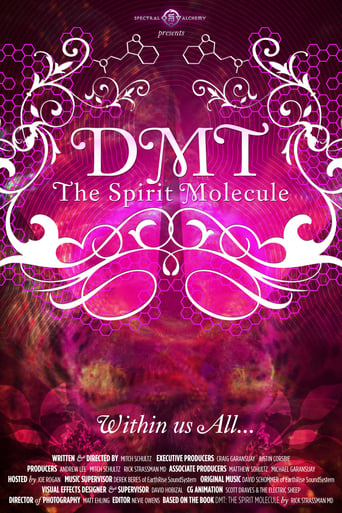bubble bobble
Two decades after the first DMTS trials, trans-media producer Mitch Schultz created a documentary film based on this unusual material (using the same name as the book), creating a counterculture sensation that is now available on Netflix, iTunes and Hulu. A variety of experts voice their unique thoughts and experiences with DMT within their respective fields. As Strassman's story unfolds, the contributors weigh in on his remarkable theories, including the synthesis of DMT in our brain's pineal gland, and its link to near-death experiences.
Ben Harding
Perhaps stating it may be the molecule of life is a bit of a stretch - however, the accounts of people who have taken DMT provide something hard to dismiss.Reading a few of the other reviews of this documentary shocks me. Some state that it is complete nonsense, adding it is unscientific and panders to wishful thinking. While the stories seem like something you'd find in a science-fiction movie, (and the visuals certainly don't make that point any less valid!) those comments go against the entire point of the film. Although I do not think these experiences are spiritual in the religious sense, the effect it has on the brain is too profound to ignore. I can almost compare it to marijuana: Some people ascribe its effects to a higher form of consciousness and healing, while others demonize it as unhealthy and corruptive to the mind. DMT and marijuana are, of course, in completely different categories, but their properties add a different dimension to reality. There is no longer an excuse for us to put a barrier between us and what is found in nature. The documentary does not state that drugs are inherently good for you, but that research should provide answers to what extent that may be the case. I will respectfully disagree with other reviewers of this documentary and say it is definitely for the scientific-minded. As with everything, don't believe everything you see. Investigate for yourself - that is, after all what the scientific method is about.
westside-surfer
The Spirit Molecule was informative and entertaining introduction to DMT. My research on the pineal gland, which led to DMT, uncovered a flood of pseudoscience and nut-jobs. I keep an open mind, I but stop listening once the speaker ventures into the Illuminati and ancient aliens. No thank you, I'll watch X-files instead.The documentary anchored itself in science then plunged into metaphysics. Half the panel were accredited professionals; the other half were artists, writers, and mystics. Surprisingly, the opposing sides complimented each other by providing an insight connected with their expertise. Besides introducing DMT, the documentary addresses the role of psychedelics in ancient and contemporary life.Now for the problems: 1) Though Joe Rogen is a funny guy, his role as the host lowered the overall credibility almost to a mocking level.2) The speedy cuts between interviewees and visual effects was very distracting. Many times I stopped listening to speaker because the psychedelic visuals kept distracting me. Also the trippy soundtrack, which was neat at first, was overdone. A good director would have sensed when artistic team was going too far.I enjoyed this documentary and recommend it to anyone with an interest in science and metaphysics.
collins-803
This documentary is yet again another example why one of the biggest obstacles to dispelling societal ignorance around psychotropics is often the users themselves. If you're looking for scientific explanations around the properties, effects, and potential side-effects around DMT, look no further. Instead you'll discover the film begins to devolve into various sweeping statements ranging from the pseudo-scientific to the completely unscientific ramblings of mystics.The film begins to explore the idea that we can use psychotropics --DMT in particular-- for the sake of exploring and discovering aspects of reality that might not be available to us in ordinary perception. Fair enough, as long as we keep in mind what we're "discovering" are interesting chemically induced perceptions, and not, as many of the film's most wildly metaphysical poetic-waxing statements claim, real parts of the universe "out there" that are hidden from us with the "ball and chain" of reason and scientific confirmation.The way that it presents these musings is through interviews of various psychologists, "writers", mystics, and "shamans" interspersed between what seems to be winamp animations and art taken from Alex Grey. Sure, okay, it's a film about DMT. But it's hardly inventive compared to the master Gaspar Noe film Enter the Void where the drug is featured heavily.People's perception of psychotropics is an erasing of reason for New Age tarot-card reading "channeling" of other dimensions by hippies. It's an unfortunate misperception, one that this film surely would confirm even to the open minded. In the end it adds to the list of the pseudo-scientific New Age "what the bleep" nonsense that attempts to pass off as credible. Instead of dispelling the ignorance, it reflects this society's scientific illiteracy in an unfortunate postmodern age where drug induced fast food religious experiences pass as empirical research. But you know, as the postmodernists will tell me, "well, that's like...your opinion...man..."




